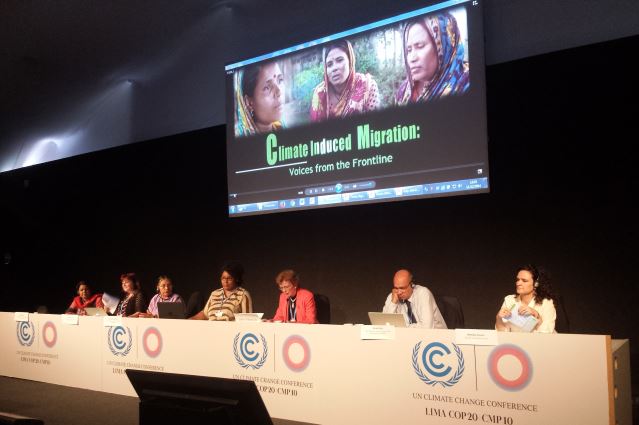Climate change adaptation, resilience and human mobility were the focus of the discussion at a side event called “Voices from the Climate Frontlines” moderated by Mary Robinson on 11 December at COP20/CMP10 in Lima.
The event was organised by the office of the United Nations High Commissioner for Refugees (UNHCR), UN WOMEN, United Nations University Institute for Environment and Human Security (UNU-EHS) and the International Organisation for Migration.
During the panel discussion, five climate action leaders who are working at the frontlines of climate change impacts talked about climate-induced displacement and its gender dimensions. They also discussed how some forms of human mobility can facilitate adaptation to the effects of climate change and avoid forced displacement.
Cristina Tirado, Professor at University of California, Los Angeles (UCLA) Institute for Environment and Sustainability, emphasised how climate change induced displacement can violate a number of human rights of displaced people, especially women, who often face increased risks to their reproductive health, maternal deaths, malnutrition, gender-based violence and mental health.
Tarcila Rivera Zea, Founder and President of CHIRAPAQ, Centre for Indigenous Cultures of Peru, outlined the need for an increase in adaptation and mitigation programmes and emphasised the need for these programmes to take people’s cultural identity into consideration.
Emad Adly, General Coordinator of the Arab Network for Environment and Development (RAED), shared examples of capacity building projects that engage young people in Disaster Risk Reduction activities and called for greater inclusion of young people, women and civil society actor in all in decision making processes around climate action.
Mafalda Duarte, Manager of the Climate Investment Funds (CIF), concluded the panel statements with a presentation on the social dimensions of climate change induced displacement and migration.
Other speakers included Zakia Naznin, Gender Specialist at the Bangladesh Center for Advanced Studies (BCAS) who gave a presentation on projects run by BCAS that work on reducing the vulnerability of women affected by climate change through alternative livelihood options.
The event concluded with an interactive Q&A session with the audience.
Related links
Women at the Heart of Sustainable Peace
Foundation highlights importance of participation in climate change negotiations


